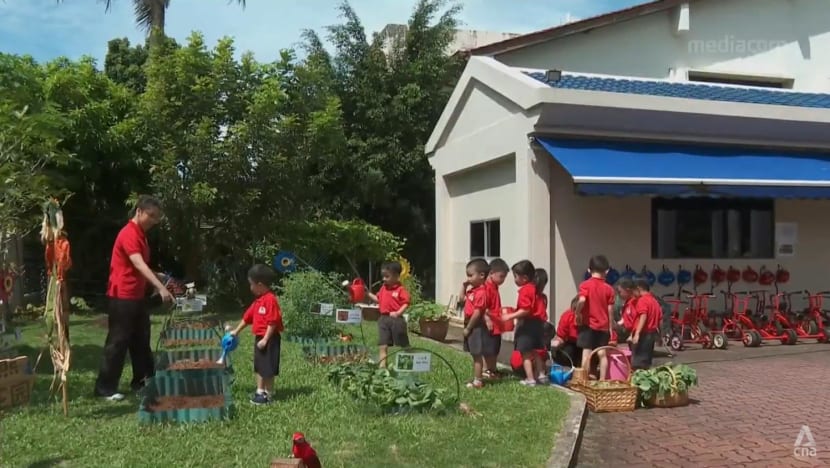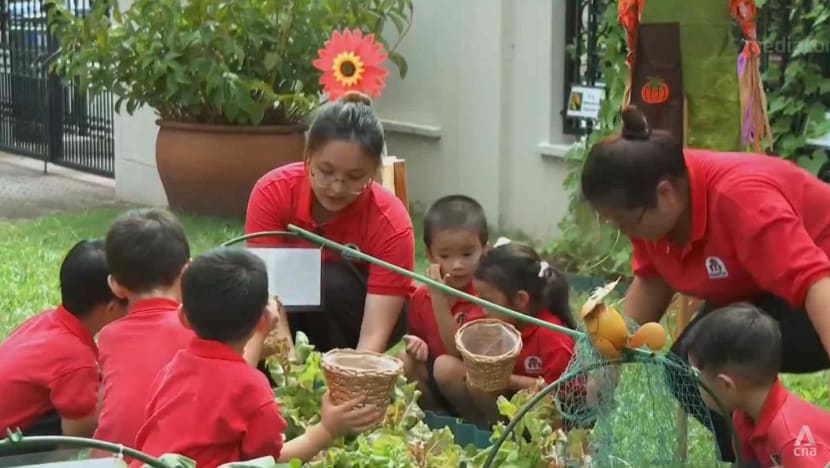Pre-schools in Singapore sowing seeds of sustainability in their pupils
Children at such a young age are more receptive to fresh ideas, making it easier to shape their mindsets about sustainability, said educators.

Green activities at pre-schools in Singapore include gardening and harvesting for meal times to learn about the circular economy.
SINGAPORE: Pre-schools in Singapore are adding green education initiatives to their curriculum, hoping to teach children about sustainability from an early age.
Children at some kindergartens, for instance, are already learning about the circular economy by taking part in activities such as basic gardening, composting and recycling.
Such sustainability education is in line with Singapore's vision of becoming a zero-waste nation – as part of the wider Singapore Green Plan – and reducing the amount of waste sent to the Semakau landfill by 30 per cent by the end of this decade.
HANDS-ON LEARNING
At such a tender age, children may not see the full meaning behind some activities due to a lack of understanding or maturity, but it is still important to expose them to these concepts, said Mrs Anita Yuen, director of schools at MapleBear Singapore.
"We recognise that the children are very young. And while we can try our best to teach them, we also have to have it really in bite sizes, where they are able to manage,” she said.
As they grow, children will gradually understand the meaning behind what they have been taught, she added.
At MapleBear Preschool, pre-schoolers plant vegetables in a garden, which they then harvest and enjoy at meal times. It is the school’s way of making the circular economy concept digestible for the children.

The concept of “reduce, reuse and recycle” also goes beyond food.
For example, the school practices recycling throughout the year, collecting materials to create props for their end-of-year graduation concert, such as styrofoam and cardboard.
At another pre-school, Little Skool-House, pupils recycle kitchen scraps into compost for the community garden, using the school’s newly acquired food waste machine that gobbles up leftovers like egg shells and apple cores.
Ms Tan Chujun, principal of the Little Skool-House located at Republic Polytechnic, said the school’s programme is developed around topics that the children are interested in.
“So they have been very curious since the food waste machine arrived in school. They are asking questions on how and what really happens in the food waste machine,” she said, adding that the children can observe the process of food being broken down in the compost bottles.
“From there, they know that whenever they see leftovers, they are very conscious of reminding one another to finish up, or they can put it into the food waste machine,” said Ms Tan.
TRICKLE-UP EFFECT
Training pupils from such a young age generates a trickle-up effect, said educators.
Mrs Yuen, who has more than 18 years of experience in the education sector, said children are more receptive to fresh ideas, making it easier to shape their mindsets.
“You want to be able to inculcate all these good habits, and also make them aware of what the environment would be like if they (do not) help to take care of their environment,” she said.
Ms Tan from Little Skool-House said that her pupils have been “our advocates”, adding that they take home with them what they learn in school, reminding their parents and practising it at home.
















